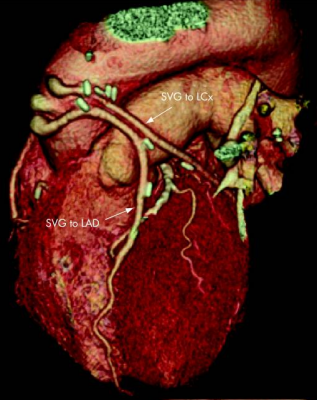
August 2, 2012 — Results of the ROMICAT II trial indicates coronary computed tomography (CT) angiography (CCTA) as a safe and time-efficient noninvasive modality to evaluate patients with chest pain in the emergency department (ED) when compared to the current standard approach.
ROMICAT II (Rule Out Myocardial Ischemia/Infarction Using Computer Assisted Tomography) is a multicenter randomized comparative effectiveness trial of CCTA versus standard triage evaluation in acute chest pain patients in the ED. The study, lead by Udo Hoffmann, M.D., from the Massachusetts General Hospital, examines whether integrating CCTA improves the efficiency of the management of low-intermediate risk patients. The trial involved 1000 patients who entered the ED with chest pain and, after initial evaluation, were randomly assigned to either a CCTA scan or to standard triage evaluation.
Results indicated that patients diagnosed with a CT scan reduced their mean average time spent in the hospital by 7.6 hours. Fifty percent of patients receiving the CCTA scan were safely discharged within nine hours, while only 15 percent of patients receiving standard of care as a diagnosis were discharged in that time period. The reduced time produced an ED cost savings for the CCTA group of 18 percent, compared to the standard of care diagnosis ($2,101 vs. $2,566). However, the mean cost of care, including hospital stay, was similar between both groups ($4,026 vs. $3,874). Long-term cost data was not available which would allow determining whether negative CCTA results would allow fewer repeat visits to the ED and hospitalizations over a longer time period.
One critical piece of information that may have not been emphasized enough is that the rate of adverse cardiovascular events (MACE) at 28 days in the standard of care ED evaluation was 1.2 percent (including four myocardial infarctions [MI] and two cases of unstable angina for which percutaneous coronary intervention [PCI] was required). The CCTA approach had only two events (0.4 percent) at 28 days; however, in both cases CCTA established correctly clinically significant coronary artery disease (CAD) during the initial hospitalization, but both patients had negative stress tests and were initially treated medically. It is important to emphasize that the 1.2 percent rate of MACE in the standard of care group is above the "acceptable" rate (<1 percent) of missing a patient with acute coronary syndrome in the ED setting.
While the randomized comparison in this study showed increased cumulative radiation dose in the CCTA group, it is important to emphasize that nearly all patients in the CCTA group (97 percent), but only 33 percent of patients randomly assigned to standard evaluation, were exposed to radiation from an imaging test or procedure. The mean radiation dose from CCTA (11.3±5.3 mSv) was lower than single photon emission CT (14.1±4.8 mSv, P<0.001). Nowadays diagnostic-quality CCTA can be performed routinely in clinical practice with doses of less than 5 mSv. SCCT highly recommends and promotes the use of radiation dose reduction techniques in clinical practice.
"This study adds to the growing body of evidence that assessment of low- to intermediate-risk patients with CCTA improves efficiency in the ED. Because it is highly accurate in selecting those without coronary disease, this test also removes the uncertainty that patients and physicians alike often continue to feel after these patients are evaluated with the standard approach to acute chest pain," said John Lesser, president of SCCT.
"The results of the ROMICAT II trial support prior available evidence from two other large randomized trials (ACRIN-PA and CT-STAT) confirming the safety of a negative CTA to discharge patients, leading to decreased length of stay and potential cost savings. Cautious implementation of this modality in the ED setting is needed to ensure proper patient selection and preparation, implementation of radiation dose reduction techniques, and assurance of available expertise and coverage," said Ricardo C. Cury, chairman of radiology and director of cardiac imaging, Baptist Hospital of Miami and Baptist Cardiac and Vascular Institute.
For more information: www.scct.org


 January 05, 2026
January 05, 2026 









